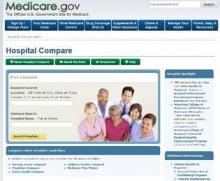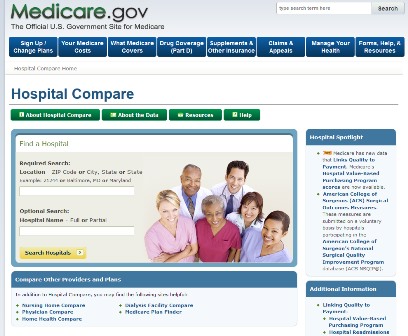User login
On one of my recent Internet excursions I spent some time on a highly useful website, Hospital Compare. This site is sponsored by Medicare.gov and provides a plethora of useful information for health care consumers who want to know quality metrics on health care facilities in their area. There is quality data on over 4,000 Medicare-certified hospitals across the country.
Hospital Compare is a very user-friendly site. Even those among us who are not so Web savvy can navigate this site in a snap. Just type in your zip code and up pops a list of hospitals in your specified area. You can even narrow your search by requesting what type of hospital you are interested in – acute care Veterans Affairs, acute care, children’s, or critical care access hospitals.
Next, putting a check in the boxes next to hospitals you want to compare produces a grid describing the different facilities. Users can find out which hospitals provide emergency services and whether lab results can be tracked between visits.
Of more interest to hospitalists is the next tab: Patient Survey Results. Here you can find out how well physicians and nurses on your staff communicated with patients during their hospitalization versus how well other health care providers in your region performed.
Scrolling through the tabs, you will then find tabs for Timely & Effective Care, which compares inpatient core measures, such as the percentage of patients with MI given aspirin at discharge and the percentage of heart failure patients receiving an ACE inhibitor or an angiotensin receptor blocker. Users can even find out the average wait time in the ED prior to being admitted to a particular hospital.
There is information on how to save money on prescription drugs, advanced directives and long term care, Medicare rights and forms, readmissions, hospital complications, 30-day death rates, health care–associated infections, and much more. While perusing that site, I also came upon yet another great site, Nursing Home Compare. Medicare.gov’s Nursing Home Compareis also chock-full of information for patients and family members who want to find the best care possible. Not only does it rate nursing homes, it gives ratings for rehabilitation facilities as well.
I was shocked to find out that one nursing home near my home had a terrible health inspection rating, while another one close by received flying colors for this metric. This type of information is invaluable for patients who are already sick and vulnerable. This site even provides information about fire safety ratings and details of health inspection reports and complaints.
Patients often ask me what I think about various facilities in the area, and I have had very little valuable information to offer them. It seemed like I always deferred that question to the social worker. Now, I can refer them to this website to help them make very important choices for their health care as well as care for their loved ones.
Dr. Hester is a hospitalist with Baltimore-Washington Medical Center who has a passion for empowering patients to partner in their health care. She is the creator of the Patient Whiz, a patient-engagement app for iOS.
On one of my recent Internet excursions I spent some time on a highly useful website, Hospital Compare. This site is sponsored by Medicare.gov and provides a plethora of useful information for health care consumers who want to know quality metrics on health care facilities in their area. There is quality data on over 4,000 Medicare-certified hospitals across the country.
Hospital Compare is a very user-friendly site. Even those among us who are not so Web savvy can navigate this site in a snap. Just type in your zip code and up pops a list of hospitals in your specified area. You can even narrow your search by requesting what type of hospital you are interested in – acute care Veterans Affairs, acute care, children’s, or critical care access hospitals.
Next, putting a check in the boxes next to hospitals you want to compare produces a grid describing the different facilities. Users can find out which hospitals provide emergency services and whether lab results can be tracked between visits.
Of more interest to hospitalists is the next tab: Patient Survey Results. Here you can find out how well physicians and nurses on your staff communicated with patients during their hospitalization versus how well other health care providers in your region performed.
Scrolling through the tabs, you will then find tabs for Timely & Effective Care, which compares inpatient core measures, such as the percentage of patients with MI given aspirin at discharge and the percentage of heart failure patients receiving an ACE inhibitor or an angiotensin receptor blocker. Users can even find out the average wait time in the ED prior to being admitted to a particular hospital.
There is information on how to save money on prescription drugs, advanced directives and long term care, Medicare rights and forms, readmissions, hospital complications, 30-day death rates, health care–associated infections, and much more. While perusing that site, I also came upon yet another great site, Nursing Home Compare. Medicare.gov’s Nursing Home Compareis also chock-full of information for patients and family members who want to find the best care possible. Not only does it rate nursing homes, it gives ratings for rehabilitation facilities as well.
I was shocked to find out that one nursing home near my home had a terrible health inspection rating, while another one close by received flying colors for this metric. This type of information is invaluable for patients who are already sick and vulnerable. This site even provides information about fire safety ratings and details of health inspection reports and complaints.
Patients often ask me what I think about various facilities in the area, and I have had very little valuable information to offer them. It seemed like I always deferred that question to the social worker. Now, I can refer them to this website to help them make very important choices for their health care as well as care for their loved ones.
Dr. Hester is a hospitalist with Baltimore-Washington Medical Center who has a passion for empowering patients to partner in their health care. She is the creator of the Patient Whiz, a patient-engagement app for iOS.
On one of my recent Internet excursions I spent some time on a highly useful website, Hospital Compare. This site is sponsored by Medicare.gov and provides a plethora of useful information for health care consumers who want to know quality metrics on health care facilities in their area. There is quality data on over 4,000 Medicare-certified hospitals across the country.
Hospital Compare is a very user-friendly site. Even those among us who are not so Web savvy can navigate this site in a snap. Just type in your zip code and up pops a list of hospitals in your specified area. You can even narrow your search by requesting what type of hospital you are interested in – acute care Veterans Affairs, acute care, children’s, or critical care access hospitals.
Next, putting a check in the boxes next to hospitals you want to compare produces a grid describing the different facilities. Users can find out which hospitals provide emergency services and whether lab results can be tracked between visits.
Of more interest to hospitalists is the next tab: Patient Survey Results. Here you can find out how well physicians and nurses on your staff communicated with patients during their hospitalization versus how well other health care providers in your region performed.
Scrolling through the tabs, you will then find tabs for Timely & Effective Care, which compares inpatient core measures, such as the percentage of patients with MI given aspirin at discharge and the percentage of heart failure patients receiving an ACE inhibitor or an angiotensin receptor blocker. Users can even find out the average wait time in the ED prior to being admitted to a particular hospital.
There is information on how to save money on prescription drugs, advanced directives and long term care, Medicare rights and forms, readmissions, hospital complications, 30-day death rates, health care–associated infections, and much more. While perusing that site, I also came upon yet another great site, Nursing Home Compare. Medicare.gov’s Nursing Home Compareis also chock-full of information for patients and family members who want to find the best care possible. Not only does it rate nursing homes, it gives ratings for rehabilitation facilities as well.
I was shocked to find out that one nursing home near my home had a terrible health inspection rating, while another one close by received flying colors for this metric. This type of information is invaluable for patients who are already sick and vulnerable. This site even provides information about fire safety ratings and details of health inspection reports and complaints.
Patients often ask me what I think about various facilities in the area, and I have had very little valuable information to offer them. It seemed like I always deferred that question to the social worker. Now, I can refer them to this website to help them make very important choices for their health care as well as care for their loved ones.
Dr. Hester is a hospitalist with Baltimore-Washington Medical Center who has a passion for empowering patients to partner in their health care. She is the creator of the Patient Whiz, a patient-engagement app for iOS.

